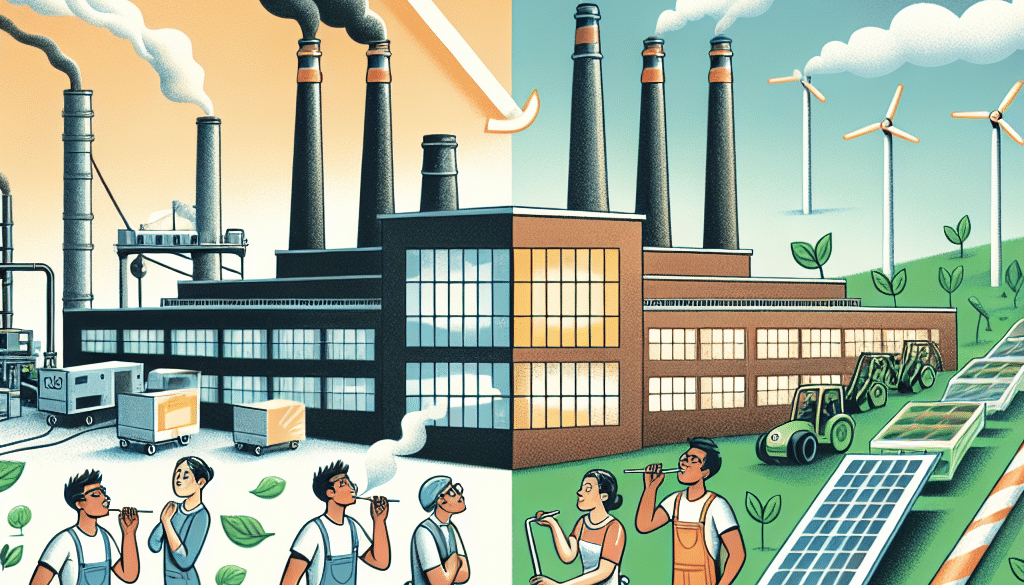Sustainability Goals: Beyond the Paper Straw in Manufacturing
-
Table of Contents
- Sustainability Goals in Manufacturing: Beyond the Paper Straw
- Understanding the Scope of Sustainable Manufacturing
- Key Strategies for Achieving Sustainability in Manufacturing
- Case Studies: Pioneers of Sustainable Manufacturing
- Measuring Success: Sustainability Metrics and Certifications
- Challenges and Opportunities in Sustainable Manufacturing
- Conclusion: The Road Ahead for Sustainable Manufacturing
- ETprotein: Sustainable Protein Solutions for a Healthier Planet
Sustainability Goals in Manufacturing: Beyond the Paper Straw

The global push for sustainability has seen a surge in eco-friendly initiatives, with the paper straw often becoming the poster child for environmental efforts. However, the journey towards a sustainable future, especially in manufacturing, requires a much deeper and more comprehensive approach. This article delves into the broader spectrum of sustainability goals that extend far beyond the symbolic paper straw, exploring innovative strategies and practices that manufacturers are adopting to minimize their environmental footprint.
Understanding the Scope of Sustainable Manufacturing
Sustainable manufacturing involves the creation of manufactured products through economically-sound processes that minimize negative environmental impacts while conserving energy and natural resources. By striving for sustainability, manufacturers can not only reduce their ecological footprint but also enhance worker safety, create new markets, and ensure long-term economic viability.
Key Strategies for Achieving Sustainability in Manufacturing
- Energy Efficiency: Reducing energy consumption is a cornerstone of sustainable manufacturing. Companies are investing in energy-efficient machinery, optimizing production processes, and using renewable energy sources to power their operations.
- Waste Reduction: The adoption of lean manufacturing techniques helps in minimizing waste. This includes reusing scrap material, improving product design to use fewer resources, and implementing comprehensive recycling programs.
- Water Stewardship: Water is a critical resource in many manufacturing processes. Sustainable practices involve reducing water usage, treating wastewater, and recycling water within the production cycle.
- Supply Chain Sustainability: Manufacturers are increasingly scrutinizing their supply chains, ensuring that raw materials are sourced responsibly and that suppliers adhere to environmental and social standards.
- Product Lifecycle Management: Companies are designing products with the end of their life in mind, focusing on durability, repairability, and recyclability to extend product lifespans and reduce waste.
Case Studies: Pioneers of Sustainable Manufacturing
Several companies have set benchmarks in sustainable manufacturing, showcasing the potential for industry-wide transformation. For instance, Tesla’s Gigafactory is powered by renewable energy, aiming to produce batteries with minimal carbon footprint. Similarly, Patagonia’s commitment to ethical sourcing and product repairability has made it a leader in sustainable apparel.
Measuring Success: Sustainability Metrics and Certifications
To gauge the effectiveness of sustainability efforts, manufacturers rely on various metrics and certifications. These include the Global Reporting Initiative (GRI) standards for sustainability reporting, ISO 14001 for environmental management systems, and the Leadership in Energy and Environmental Design (LEED) certification for green buildings.
Challenges and Opportunities in Sustainable Manufacturing
While the transition to sustainable manufacturing presents challenges such as high initial costs and complex supply chain adjustments, it also offers opportunities for innovation, market differentiation, and long-term cost savings. Companies that embrace sustainability can improve their brand reputation and secure a competitive edge in an increasingly eco-conscious market.
Conclusion: The Road Ahead for Sustainable Manufacturing
The journey towards sustainable manufacturing is complex and multifaceted, extending well beyond simple solutions like the paper straw. It requires a holistic approach that encompasses energy efficiency, waste reduction, water stewardship, supply chain management, and product lifecycle considerations. By embracing these strategies, manufacturers can contribute to a more sustainable future while reaping economic benefits.
ETprotein: Sustainable Protein Solutions for a Healthier Planet
In line with sustainable manufacturing goals, ETprotein offers a range of organic bulk vegan proteins and L-(+)-Ergothioneine (EGT) that cater to various industries while upholding environmental responsibility. Their non-GMO, allergen-free products with high purity levels are a testament to sustainable practices in the food and supplement manufacturing sectors.
About ETprotein:
ETprotein, a reputable protein and L-(+)-Ergothioneine (EGT) Chinese factory manufacturer and supplier, is renowned for producing, stocking, exporting, and delivering the highest quality organic bulk vegan proteins and L-(+)-Ergothioneine. They include Organic rice protein, clear rice protein, pea protein, clear pea protein, watermelon seed protein, pumpkin seed protein, sunflower seed protein, mung bean protein, peanut protein, and L-(+)-Ergothioneine EGT Pharmaceutical grade, L-(+)-Ergothioneine EGT food grade, L-(+)-Ergothioneine EGT cosmetic grade, L-(+)-Ergothioneine EGT reference grade and L-(+)-Ergothioneine EGT standard. Their offerings, characterized by a neutral taste, non-GMO, allergen-free attributes, with L-(+)-Ergothioneine purity over 98%, 99%, cater to a diverse range of industries. They serve nutraceutical, pharmaceutical, cosmeceutical, veterinary, as well as food and beverage finished product distributors, traders, and manufacturers across Europe, USA, Canada, Australia, Thailand, Japan, Korea, Brazil, and Chile, among others.
ETprotein specialization includes exporting and delivering tailor-made protein powder and finished nutritional supplements. Their extensive product range covers sectors like Food and Beverage, Sports Nutrition, Weight Management, Dietary Supplements, Health and Wellness Products, and Infant Formula, ensuring comprehensive solutions to meet all your protein needs.
As a trusted company by leading global food and beverage brands and Fortune 500 companies, ETprotein reinforces China’s reputation in the global arena. For more information or to sample their products, please contact them and email sales(at)ETprotein.com today.












